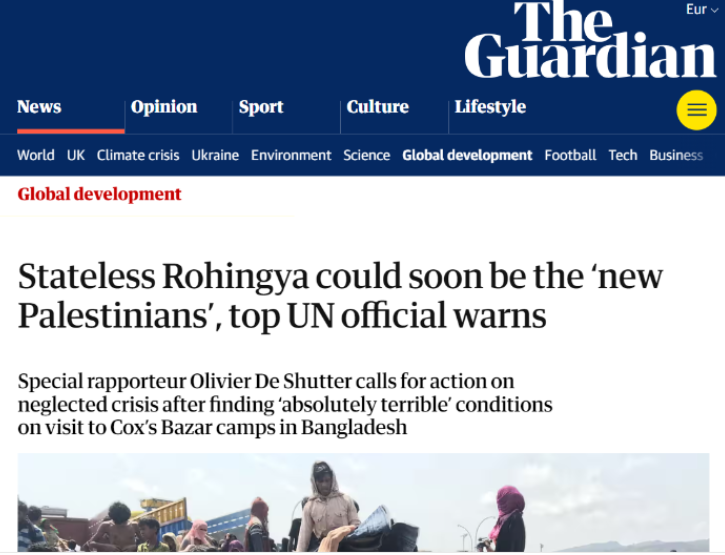When we talk about stateless people, the Rohingya of Myanmar and the Palestinians often emerge as two of the most glaring examples. Separated by geography, culture, and religion, their struggles bear striking similarities in the way both have been marginalized, displaced, and persecuted.
Both groups face a grim fight for recognition and autonomy, with their oppressors backed by the inertia of global politics and regional powers.
Displacement and Statelessness
The Rohingya, a Muslim minority in Myanmar (formerly Burma), have faced decades of persecution. Primarily concentrated in Rakhine State, they are considered illegal immigrants from Bangladesh by the Myanmar government, despite evidence of their centuries-long presence in the region. In 1982, Myanmar effectively rendered the Rohingya stateless by denying them citizenship.
Similarly, Palestinians have faced displacement since the establishment of Israel in 1948. With the Nakba, or “catastrophe,” over 700,000 Palestinians were forced to flee their homes and became refugees in neighboring countries. Today, millions of Palestinians still live as refugees, stateless within Israel or in territories like the West Bank and Gaza Strip.
Both groups are locked in a cycle of displacement, unable to fully return to their ancestral lands or gain citizenship in new regions. These situations create a complex political landscape where they exist in legal limbo, without a clear path toward statehood or autonomy.
To read about the dictatorship in Myanmar click here.
Denial of Rights and Identity
One of the most harrowing parallels between the Rohingya and Palestinians is their denial of basic human rights. The Myanmar government, controlled for decades by a military junta, has systematically denied the Rohingya education, healthcare, and freedom of movement. Israeli authorities, meanwhile, have long imposed severe restrictions on Palestinians in the occupied territories. These include checkpoints, curfews, and restricted access to vital resources such as water and electricity.
Both groups also face erasure of their identities. In Myanmar, the government refers to the Rohingya as Bengali, insinuating they do not belong to the country. Palestinians, especially in East Jerusalem, face the slow erasure of their identity through settlement building and the destruction of homes. As international observers look on, these actions erode the possibility of either group establishing a recognized homeland.
Ethnic Cleansing and Genocide
The treatment of the Rohingya has led to accusations of ethnic cleansing, especially after the events of 2017 when the Myanmar military conducted a brutal crackdown in Rakhine State, forcing over 700,000 Rohingya to flee into neighboring Bangladesh. Reports of mass killings, rape, and the burning of villages led international organizations to accuse Myanmar of genocide.
For Palestinians, while the violence may not have escalated to the same level, many argue that Israeli policies constitute ethnic cleansing through the destruction of homes, the creation of Jewish settlements, and the expansion of the separation wall, which further fragments Palestinian land. Over the decades, Palestinians have seen large portions of their historic lands being appropriated, leading some to draw parallels between their experience and that of the Rohingya.
Lack of International Action
One striking similarity between the Rohingya and Palestinians is the international community’s failure to adequately address their suffering. While global organizations like the United Nations and human rights groups regularly issue condemnations, concrete action remains elusive. In the case of the Rohingya, the International Court of Justice began hearings to determine if Myanmar’s actions constituted genocide, but real political pressure on the Myanmar government has been lacking.
Similarly, the Israeli-Palestinian conflict has seen countless resolutions and peace talks stall over the years, with the situation in the Gaza Strip often called the world’s largest open-air prison. Despite UN resolutions calling for a two-state solution, international powers have been reluctant to intervene meaningfully, often due to political interests and geopolitical alliances.
Links to Communism and Global Politics
Interestingly, both Myanmar and Palestine have found themselves caught in the broader framework of global politics, particularly during the Cold War era. In the case of Myanmar, the military junta that controlled the country for decades was deeply suspicious of communist movements, leading to internal purges. However, during the Cold War, both China and the Soviet Union had interests in Myanmar, influencing its political landscape.
To read about Burmese socialism click here.
For the Palestinians, alliances with communist countries like the Soviet Union were prominent during the 20th century. The Palestinian Liberation Organization (PLO), led by Yasser Arafat, received support from the USSR as part of the broader Cold War rivalry. This geopolitical alignment created a situation where Palestine’s fate was often caught in the crossfire of superpower politics, much like Myanmar’s delicate balancing act with its more powerful neighbors.
To read about street food in Yangon click here.
Struggles for Autonomy and Self-Determination
Ultimately, the core of both the Rohingya and Palestinian struggles revolves around the fight for self-determination and autonomy. For the Rohingya, their statelessness means they have no political representation or voice in Myanmar’s future. Despite fleeing to Bangladesh, they remain in refugee camps, with no clear path to return home or gain citizenship.
In Palestine, the battle for statehood has been ongoing since 1948. Despite numerous peace talks, the establishment of a Palestinian state seems as distant as ever, with each failed negotiation only deepening the division between the two groups. Both Palestinians and the Rohingya live under the constant threat of violence, whether from state forces or extremist factions.
Conclusion: A Shared Struggle for Justice
In both Myanmar and Palestine, the ongoing struggles of the Rohingya and Palestinians highlight the broader challenges faced by stateless people and oppressed minorities around the world. These are communities pushed to the margins of society, denied their basic rights, and subjected to violence and discrimination. Whether through direct ethnic cleansing or gradual erasure, both the Rohingya and Palestinians face a daunting fight for recognition, justice, and self-determination.

